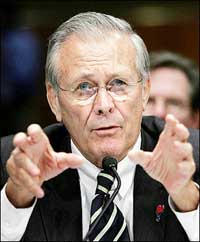|
Why does US rev up China threat?
By Michael T. Klare (The Nation)
Updated: 2005-10-08 15:38
Ever since taking office, the Bush Administration has struggled to define its stance on the most critical long-term strategic issue facing the United States: whether to view China as a future military adversary, and plan accordingly, or to see it as a rival player in the global capitalist system. Representatives of both perspectives are nestled in top Administration circles, and there have been periodic swings of the pendulum toward one side or the other. But after a four-year period in which neither outlook appeared dominant, the pendulum has now swung conspicuously toward the anti-Chinese, prepare-for-war position. Three events signal this altered stance.

US Defense Secretary Donald Rumsfeld, pictured September 2005. [AFP] |
The first, on February 19, was the adoption of an official declaration calling for enhanced security ties between the United States and Japan. Known officially as the "Joint Statement of the U.S.-Japan Security Consultative Committee," the declaration was announced at a meeting of top Japanese and U.S. officials, including Defense Secretary Rumsfeld and Secretary of State Rice. The very fact that U.S. and Japanese officials were discussing improved security links at this time was deeply troubling to the Chinese, given their painful exposure to Japanese militarism during World War II and their ongoing anxiety about U.S. plans to construct an anti-Chinese alliance in Asia. But what most angered Beijing was the declaration's call for linked U.S.-Japanese efforts to "encourage the peaceful resolution of issues concerning the Taiwan Strait through dialogue." While sounding relatively innocuous to American ears, this announcement was viewed in Beijing as highly provocative, representing illicit interference by Washington and Tokyo in China's internal affairs. The official New China News Agency described the joint declaration as "unprecedented" and quoted a senior foreign ministry official as saying that China "resolutely opposes the United States and Japan in issuing any bilateral document concerning China's Taiwan, which meddles in the internal affairs of China and hurts China's sovereignty."
The second key event was a speech Rumsfeld gave June 4 at a strategy conference in Singapore. After reviewing current security issues in Asia, especially the threat posed by a nuclear North Korea, Rumsfeld turned his attention to China. The Chinese can play a constructive role in addressing these issues, he observed. "A candid discussion of China...cannot neglect to mention areas of concern to the region." In particular, he suggested that China "appears to be expanding its missile forces, allowing them to reach targets in many areas of the world," and is otherwise "improving its ability to project power" in the region. Then, with consummate disingenuousness, he stated, "Since no nation threatens China, one must wonder: Why this growing investment? Why these continuing large and expanding arms purchases? Why these continuing robust deployments?"
To Beijing, these comments must have been astonishing. No one threatens China? What about the U.S. planes and warships that constantly hover off the Chinese coast, and the nuclear-armed U.S. missiles aimed at China? What about the delivery over the past ten years of ever more potent U.S. weapons to Taiwan? But disingenuousness aside, Rumsfeld's comments exhibited a greater degree of belligerence toward China than had been expressed in any official U.S. statements since 9/11, and were widely portrayed as such in the American and Asian press.
|